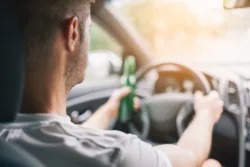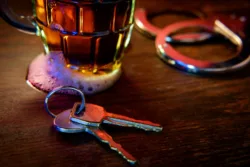Ensuring that Your Prescriptions Don’t Land You with a DUI Charge

Driving under the influence is a serious crime. Not only are you endangering yourself physically, but you could harm another person or cause damage to your future.
While most people understand the hazards of driving under the influence, fewer realize that even prescription drugs can cause issues on the road. In this article we’ll share what prescription drugs can lead to a DUI charge, plus signs that you shouldn’t drive and when to tell your doctor.
Can I get a DUI charge that isn’t related to drunk driving?
Yes. While DUIs mean different things in different states (it may be called a DWI), driving under the influence of alcohol, drugs or even sleepiness can result in a DUI charge.
Before you get behind the wheel, it’s important to ensure that your mental capabilities are not compromised in any way. Whether it’s—driving after drinking, using drugs, a combination of the two, driving in an overly emotional state, driving drowsy or driving when you’re unable to focus—are all bad ideas and could end up costing you.
Driving under the influence of drugs also includes those that are legally prescribed. Although you may require substances to manage a physical or mental condition, that doesn’t guarantee they’re safe for the road. Some legitimate drug use could impair your ability to see, think or react.
What prescriptions are dangerous to drive with?
The most commonly abused prescription drugs in the United States are painkillers, depressants and stimulants. According to the National Institute on Drug Abuse, this includes—barbiturates, benzodiazepines, sleep medications, methadone, fentanyl, oxycodone, amphetamines and more.
While prescription drugs can help you overcome physical and mental health issues, they can also cause extreme harm when they aren’t taken according to a doctor’s orders. The potential harm increases drastically when a person drives under the influence of a prescription drug.
How will I know if I can drive after taking my medication?
Most prescription medications will not affect a person’s ability to drive. However, there are some side effects that could become dangerous if they’re ignored. While your doctor should inform you of any hazardous symptoms of your medication, you’ll still want to be on guard in case the drug affects you differently than it has in the past.
Here are some side effects to look out for:
- Your vision is blurry or unreliable
- You forget something that happened only minutes ago
- You have poor coordination
- Your balance is off or you walk unsteadily
- You struggle to keep your gaze focused
- You feel drowsy
- You feel nauseous
- You have had negative reactions to your medications in the past
- You feel dizzy
- You are confused
- You haven’t slept a sufficient amount recently
- You feel paranoid or on-edge
- Your reactions are delayed or exaggerated
These side effects should clue you in that it’s a bad time to get behind the wheel. Moreover, you’ll want to alert your psychiatrist when these symptoms occur. It could be a sign that your body is reacting poorly to the medication or that over-the-counter medications are causing an unfavorable reaction.
What should I tell my doctor?
Having a poor reaction to a medication is something that you shouldn’t wait until your next appointment to address, especially if it interferes with your daily transportation.
It’s recommended that you chat with your doctor instead of making a decision to stop using a prescription on your own. Sudden cessation can cause harm, too. Your doctor will suggest a plan for tapering off medication or give you the all-clear if you’re eager to stop using a drug that interferes with your commute.
When you inform your doctor, make sure to mention the dosage, the frequency of the dosage, your symptoms and the severity of the side effects. Impairments in functioning could be caused by too high a dosage, combinations of medication, new medication, biological factors and more.
How do I get help for prescription drug abuse?
Prescription drug abuse is no joke. If you’re struggling to control your substance use, whether or not it interferes with your driving, it’s time to make a change. It could save your life.
At Rehab After Work you can find the intervention you need without compromising your personal life. Flexible scheduling and a variety of programs are designed to help you carry on with what matters most. Reach out online for the care you need.







